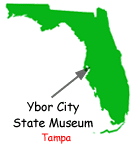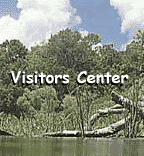
Reservations for
Florida State
Parks are now
made through
Reserve America,
toll free, at
1-800-326-3521
|
YBOR
CITY STATE MUSEUM
Don Vicente Martinez Ybor, an
influential cigar manufacturer and Cuban exile, came to a sandy, palmetto-covered
frontier and turned it into a city for thousands of immigrants. These newcomers
brought their skills and their culture, making Ybor City unique in Florida
and the "Cigar Capital of the World."
HISTORY
From the opening of the first factory in 1886 until the 1930's, Ybor City
was a flourishing Latin community. The Ybor Cigar Factory was the largest
in the world, employing more than 4,000 of the 20,000 workers in Ybor City.
Cubans, Spaniards, Italians, Germans and Jews called Ybor City home, establishing
their own newspapers, restaurants, social clubs, mutual aid societies and
hospitals. These immigrant medical services are among the earliest known
examples of cooperative social medicine in the United States.
In the closing years of the
1800's, Ybor City became a support center for the Cuban Revolution. When
war broke out between the United States and Spain in 1898, the Army stationed
thousands of men in Ybor City, including Teddy Roosevelt and his "Rough
Riders." On August 12, 1898, Cuba won its independence.
Ybor City's Latin community flourished
for many years, but technology began to eat away at its very core. Competition
by machines, popularity of cigarettes and the Depression combined to bring
about the decline of the cigar industry in Ybor City. Factories shut down,
unemployment soared and families moved away.
TODAY
Today the museum complex covers approximately one half of a city block.
It includes an ornamental garden and three restored cigar workers' houses.
One house, La Casita, is a museum.
The Ferlita Bakery building,
listed in the National Register of Historic Places, was acquired in 1976
and opened as a museum in September 1980. The bakery was a major source
of the community's daily bread and now forms the core of the museum complex.
Its ovens, colorful sign displays and exhibits delight and educate thousands
of visitors each year. The cigar worker's house, an excellent example
of the "shotgun" houses in which many cigar makers lived, reflects
family life in the early part of the 20th century. It is open for viewing
Tuesday through Saturday from 10 a.m. until noon and from 1 p.m. until
3 p.m.

Ybor City State Museum is located at the corner of 9th Avenue and 19th Street in Tampa.For more information, contact:
Ybor City State Museum
1818 Ninth Ave.
Tampa, FL 33605
or call (813) 247-6323
View Larger Map |
|



